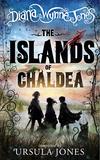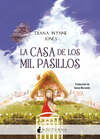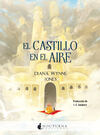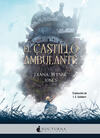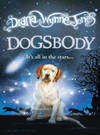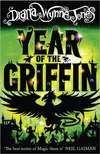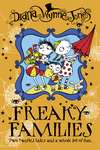Loe raamatut: «The Islands of Chaldea»



To Dave
Diana Wynne Jones
Diana, her family, friends and her readers
Ursula Jones

Cover
Title Page
Map
Dedication
Chapter One
Chapter Two
Chapter Three
Chapter Four
Chapter Five
Chapter Six
Chapter Seven
Chapter Eight
Chapter Nine
Chapter Ten
Chapter Eleven
Chapter Twelve
Chapter Thirteen
Chapter Fourteen
Chapter Fifteen
Afterword
Also by Diana Wynne Jones
Copyright
About the Publisher
Porridge is my Aunt Beck’s answer to everything. The morning after my initiation proved to be such a complete failure, she gave me porridge with cream and honey – an unheard-of luxury in our little stone house – and I was almost too upset to enjoy it. I sat shivering and my teeth chattered, as much with misery as with cold, and pushed the stuff about with my spoon, until Aunt Beck wrapped me in a big fluffy plaid and told me sharply that it was not the end of the world.
“Or not yet,” she added. “And your pigtail is almost in the honey.”
This made me sit up a little. Yesterday I had washed my hair in cold spring water full of herbs – washed all over in it as well – and it was not an experience I wanted to repeat. I had gone without food too all day before that dreadful washing, with the result that I felt damp and chilly all over, and tender as a snail’s horns, when the time came for me to go down into the Place. And I hadn’t got any drier or warmer as the night went on.
The Place, you see, is like a deep trench in the ground lined with slabs of stone with more stone slabs atop of it covered with turf. You slide down a leafy ramp to get into it and Aunt Beck pulls another stone slab across the entrance to shut you in. Then you sit there in nothing but a linen petticoat waiting for something to happen – or, failing that, for morning. There is nothing to smell but stone and damp and distant turf, nothing to feel but cold – particularly underneath you as you sit – and nothing to see but darkness.
You are supposed to have visions, or at least to be visited by your guardian animal. All the women of my family have gone down into the Place when they were twelve years old and the moon was right, and most of them seem to have had the most interesting time. My mother saw a line of princes walking slowly past her, all silvery and pale and crowned with gold circlets. I remember her telling me before she died. Aunt Beck seems to have seen a whole menagerie of animals – all the lithe kind like snakes, lizards, greyhounds and running deer, which strikes me as typical – and, in addition, she says, all the charms and lore she had ever learned fell into place in her head, into a marvellous, sensible pattern. She has been a tremendously powerful magic-maker ever since.
Nothing like that happened to me. Nothing happened at all.
No, I tell a lie. I messed it up. And I didn’t dare tell Aunt Beck. I sat there and I sat there with my arms wrapped around my knees, trying to keep warm and trying not to notice the numb cold seeping up from the hard corners of my bones that I was sitting on, and trying above all not to be scared silly about what was going to happen. The worst and most frightening thing was being shut in underground. I didn’t dare move because I was sure I would find that the side had moved inwards and the stone roof had moved down. I just sat, shivering. A lot of the time I had my eyes squeezed shut, but some of the time I forced myself to open my eyes. I was afraid that the visions would come and I wouldn’t see them because my eyes were shut.
And you know how your eyes play tricks in the dark? After a long, long time, probably at least one eternity, I thought that there was a light coming into the Place from somewhere. And I thought, Bless my soul, it’s morning! Aunt Beck must have overslept and forgotten to come and let me out at dawn! This was because I seemed to have sat there for such hours that I was positive it must be nearly lunchtime by then. So I scrambled myself around in the faint light, scraping one elbow and bumping both knees, until I was facing the ramp. The faint light did, honestly, seem to be coming in round the edges of the stone slab Aunt Beck had heaved across at the top.
That was enough to put me into a true panic. I raced up that leafy slope on my hands and knees and tried to draw the slab aside. When it wouldn’t budge, I screamed at it to open and let me out! At once! And I heaved at it like a mad thing.
Rather to my surprise, it slid across quite easily then and I shot out of the Place like a rabbit. There I reared up on my knees more astonished than ever. It was bright moonlight. The full moon was riding high and small and almost golden, casting frosty whiteness on every clump of heather and every rock and making a silver cube of our small house just down the hill. I could see the mountains for miles in one direction and in the other the silver-dark line of the sea. It was so moon-quiet that I could actually hear the sea. It was making that small secret sound you hear inside a seashell. And it was as cold out there as if the whiteness on the heather was really the frost it looked like.
I gave a great shudder of cold and shame as I looked up at the moon again. From the height of it I could see it was the middle of the night still. I had only been inside the Place for three hours at the most. And I couldn’t possibly have seen the moon from inside. It was in the wrong part of the sky.
At this it came to me that the pale light I’d seen in there had really been the start of a vision. I had made an awful mistake and interrupted it. The idea so frightened me that I plunged back down inside and seized the stone slab and heaved mightily and pulled it across the opening anyhow, before I slid right back down to the stone floor and crouched there desperately.
“Oh, please come back!” I said to the vision. “I’ll be good. I won’t move an inch now.”
But nothing else happened. It seemed quite dark in the Place and much warmer now, out of the wind, but though I crouched there for hours with my eyes wide open I never saw another thing.
In the dawn, when I heard Aunt Beck drawing back the slab, I gave a great start of terror, because I was sure she would notice that the stone had been moved. But it was still half dark and I suppose it was the last thing she expected. Anyway, she did not seem to see anything unusual. Besides, she says I was fast asleep. She had to slide down beside me and shake my shoulder. But I heard her do that. I feel so deceitful. And such a failure.
“Well, Aileen,” she said as she helped me up the ramp – I was very stiff by then – “what happened to you?”
“Nothing!” I wailed and I burst into tears.
Aunt Beck always gets quite brisk when people cry. She hates having to show sympathy. She put a coat around me and marched me away downhill, saying, “Stop that noise now, Aileen. There’s nothing to be ashamed of in that. Maybe it’s too soon for you. It happens. My grandmother – your great-grandmother Venna that is – had to go down into the Place three times before she saw anything and then it was only a wee scrap of a hedgehog.”
“But maybe I’m no good,” I blubbered. “Maybe the magic’s diluted in me because my father was a foreigner.”
“What blather,” said Aunt Beck. “Your father was a bard from Gallis and your mother chose him with great care. ‘Beck,’ she said to me, ‘this man has the true gift and I am determined to have a child from him with gifts even greater.’ Mind you, after he went the way of Prince Alasdair, this didn’t prevent her losing her head over the Priest of Kilcannon.”
And dying of it, I thought miserably. My mother died trying to bring a brother for me into the world. The baby died too and Aunt Beck, who is my mother’s younger sister, has had to bring me up since I was five years old.
“But never fear,” Aunt Beck went on. “I have noted all along that you have the makings of a great magic-worker. It will come. We’ll just have to try again at the next full moon.”
Saying which, she led me indoors to the sound of the cow mooing and the hens clucking in the next room, and sat me down in front of the porridge. I think much of my misery, as I sat and pushed rivers of cream into pools of honey, was at the thought of having to go through all that again.
“Eat it!” snapped Aunt Beck.
So I did, and it made me feel somewhat better – better enough anyway to trudge to my narrow little bed and fall asleep there until the sun had turned back down the sky in the early afternoon. I might have slept even longer, except that someone came knocking at Aunt Beck’s door.
“Open!” he said pompously. “Open in the name of the King!”
It turned out to be the Logran boy, very proud of the way his voice had broken all deep and manly. Only last week he was squeaking and roaring all over the place and people were laughing at him even more than usual. Aunt Beck opened the door and he came striding in, looking quite grand in a new uniform with the heavy pleats of the King’s plaid swinging over one shoulder.
People up at the castle may despise him and call him “The Ogre from Logra”, but I will say this for my distant cousin the King: he keeps the boy well provided for. He is always well-dressed and is as well-educated as I am – and I go up to the castle for lessons three days a week – and I think they train him in arms too. Anyway, he had a fine sword belted across his skinny hips over the combed-out sheepskin of his new jacket. I suspect he was prouder of that sword than he was even of his big new voice.
He came marching in in all his splendour and then stopped dead, staring and stammering. He had never been in our house before. First, he was obviously dismayed at how small the room was, with me propped up on one elbow in bed just beyond the cooking fire, and then he was astonished at Aunt Beck’s paintings. Aunt Beck is quite an artist. She says it is the chief gift of us people of Skarr. Our room is surrounded in paintings – there are portraits of me, of my poor dead mother and of any shepherd or fisherman who is rash enough to agree to sit still for her. My favourite is a lovely group of the castle children gathered squabbling and giggling on the steps up to the hall with the light all slantways over them in golden zigzags up the steps. But there are landscapes too, mountains, moors and sea, and several paintings of boats. Aunt Beck has even painted the screen that hides her bed to look like one of the walls, with shelves of jars and vials and a string of onions on it.
This boy – his name is a strange Logran one that sounds like Ogo, which accounts for his nickname – stared at all of it with his big smooth head thrust forward and his white spotty face wrinkled in astonishment. He had to stare hard at the screen before he could decide that this was a painting too. His ugly face flushed all pink then because he had thought it was a real wall at first.
“What’s the matter, Ogo?” said Aunt Beck. Like everyone else, she is a bit sarcastic with him.
“Th-these,” he stammered. “This is all so beautiful, so real. And—” he pointed to the group of children on the steps – “I am in this one.”
He was too, though I had never realised it before. He was the smallest one, being shoved off the bottom step by a bigger boy who was probably my cousin Ivar. Aunt Beck is very clever. She had done them all from quick charcoal sketches and none of them had ever known they were being painted.
A smug, gratified expression gathered in the creases of Aunt Beck’s lean face. She is not immune to praise, but she likes everyone to think she is strict and passionless. “Don’t forget to give your message,” she said. “What was it?”
“Oh yes.” Ogo stood to attention, with his head almost brushing the beams. He had grown a lot recently and was even taller than Aunt Beck. “I am to fetch both of you to the castle for dinner,” he said. “The King wishes to consult with you.”
“In that case,” said Aunt Beck, “will you take a mug of my beer and sit outside while Aileen gets herself dressed?”
Ogo shot a flustered look somewhere in the direction of the shelves over my head. He was very embarrassed at seeing me in bed wearing next to nothing and had been avoiding looking anywhere near me up to then. “If she’s ill,” he blustered, “she ought not to come.”
“You’re very considerate,” said Aunt Beck, “but she’s not ill – just a little tired – and we’ll both be ready directly. Outside with you now.” And she pushed a mug into his large pink hands and steered him out of the door again to the bench that catches the sun and the view of the sea. “Hurry up,” she said to me as she clapped the door shut behind him. “The blue dress and the best plaid and don’t forget to wash first. I’ll do your hair when you’re ready.”
I got up with a groan as Aunt Beck vanished behind the painted screen. I was stiff all over and still inclined to shiver. And Aunt Beck is so fussy about washing. I felt I had washed half to death yesterday and here she was expecting me to get wet all over again. But I didn’t dare disobey. I knew from bitter experience that she could always tell when I’d only wet the bowl and the face flannel. She never said she knew, but the hair-combing that followed was always punishing.
I dressed gloomily, wondering what King Kenig wanted now. He consults Aunt Beck once a week anyway, but he seldom bothers to include me. In fact, there’s quite a battle there because Aunt Beck nearly always takes me along as part of my education. Then my distant cousin King Kenig scowls and rakes at his beard, and snarls something about not needing the infantry, and Aunt Beck just gives him one of her diamond-hard smiles, very sweetly, and I usually have to stay, listening to the King asking about the omens for a raid on his neighbours or what to do about the crops this year.
The only interesting times are when Aunt Beck calls for the silver bowl to be filled and does a scrying for him. I like to watch that – not that I can ever see anything in the bowl, but I like to watch my aunt seeing. It gives you an exciting sort of shiver up your back when she says, in a strange, groaning voice, “I see fires up on the Peak of Storms and cattle stampeding.” She’s always right too. When she said that, the clans of Cormack raided from the next kingship, but thanks to Aunt Beck, our people were ready for them. I even got to see a bit of the fighting.
Anyway, as you will have gathered from this, Aunt Beck is a Wise Woman as well as a magic-worker, as all the women of our family are. The men born to us marry outside the family. This is how King Kenig comes to be a distant cousin. My great-great-grandmother’s brother married the sister of the then King and their son was King Kenig’s grandfather. At one time, our family was a large one, reputed to be the best Wise Women on the entire huge island of Skarr, but that was in the time of the Twelve Sisters of Kenneal. Now Aunt Beck and I are the only ones left. But Aunt Beck is still said to be the best there is.
She looked the part too, when she came out from behind the screen in her best dress and set about combing out my hair. My hair was still damp and there was a lot of tugging to get the stray bits of herb out of it.
It is a couple of miles to the castle, over the moor and down to the foreland, but it seemed longer because a mist came down and hid all the distances. I was tired. I trudged through the heather behind the other two, feeling small and untidy and a failure. Some of the time I was trying not to cry at the idea of having to spend another night in the Place in a month’s time.
Even if I did get initiated, then I knew with a dreadful certainty that I would never, ever be the equal of Aunt Beck. Oh, I had memorised the cantrips and procedures all right, and I knew all my herbs and weatherlore, but it takes more than that to be a proper magicwoman. I had only to look at my aunt’s tall, narrow figure striding elegantly ahead, with her plaid stylishly not quite wrapping her small, dark, neatly-plaited head, to know that. Aunt Beck’s best boots had red cork heels – they cost the earth because they came from Logra before the blockade – and never once did a splash of mud or spray of heather cling to those gleaming scarlet cubes.
My feet were muddy all over already. My hair is a messy pale brown and nothing seems to stop wisps of it separating from my pigtails. They flapped beside my face, fuzzy already. And I am short for my age. Even the younger children in the castle were taller than me now and I couldn’t see myself ever being tall or wise. I shall always be that little Aileen with the freckles and the buck teeth and no real gift at all, I thought sadly. Damn it, even Ogo looked more imposing than me.
Ogo had new shoes that laced up over his smart new trews to his knees. They must have taken a deal of leather to make because Ogo’s feet are enormous. They looked even bigger on the ends of his skinny, laced-up legs. I could see he was treading very carefully so as not to spoil them in the peat. I guessed he had promised the shoemaker to keep that pair good at least.
Poor Ogo. Everyone at the castle scolded him or jeered. He is a foreigner and different from the rest. As far as I knew, he had been left behind ten years ago when the magicmen of Logra cast the spells that made it impossible for anyone from Skarr – or Bernica, or Gallis for that matter – to cross the sea to Logra. Logra might be on the moon now for all that we can do to get to it.
We were at war with Logra then. We always are. All the same, there were quite a few families of Lograns on Skarr, traders and ambassadors, and priests and so forth, who all fled to boats on the night of the spellcasting. One or two others got left behind as well as Ogo: the mad old spinning-woman up in Kilcannon for one, and the man who claimed to be a scholar whom the Cormacks arrested as a spy, but Ogo was the only child. I believe he was five at the time. I suppose his relatives were traders or something who fled with the rest and simply forgot him. I think the worse of them for that. According to Ogo, some of them were magicmen, but that’s as maybe. If they were, they can’t have been half as good magic-workers as Aunt Beck. She never forgets anything. Ogo was lucky that King Kenig took him in.
Meanwhile, Aunt Beck went with her lovely swinging stride and Ogo marched like a pair of scissors beside her, down the hill to the river and across the stepping stones there, while I came galumphing after.
Dark shapes came out of the fog to us on the other side. “There they are now,” said my distant cousin Ivar. We had not seen him for the fog until then. “Ogo seems to have got it right for once. You can strike up now, fellows.”
“What is this?” demanded Aunt Beck, standing like a ramrod on the last stepping stone with brown water swirling below her red heels. But her voice was nearly drowned out by the sudden squeal and chant from the top of the bank as at least four pipers started on the ‘March of Chaldea’.
I was quite as astonished as my aunt. An honour of pipes was quite unheard of, at least since the days when we were the Twelve Sisters. But I could now see that there were six pipers up there – more than they had in the castle.
“I said, what is THIS?” my aunt yelled.
“Nothing, my dear cousin. Don’t be alarmed,” said Ivar. He came right to the bank and offered her his arm. “The King insisted on it for some reason. He said the ladies must be brought in with due honour.”
“Hmph,” said Aunt Beck. But she took his arm and stepped on up the bank. Ivar is a favourite of hers.
I felt better for seeing Ivar there too. He is dark and skinny, with a long neck with a big Adam’s apple in it. I consider him very handsome with his beaky, jagged profile, dark eyes and jutting cheekbones. And he makes good jokes too. Although he doesn’t know it yet, I have chosen him to be my husband when the time comes and, until then, I feel free to admire him greatly in secret. All the same, I wondered, as I scrambled up the bank, what had got into King Kenig, Ivar’s father, to escort us with pipers like this. I know the King believes in doing everything the old way, now that Logra is off our backs, but this was ridiculous!
In fact, I was quite glad of those pipers. There is something about a night with no sleep that weakens your legs. It is quite a steep climb up to the castle and without the steady, skirling beat ahead of me I would have made heavy going of it. Or I might not have got there at all. The fog was now so thick that it could have been easy to miss the way, for all I knew it so well.
As it was, I never saw the pipers clearly, just followed them until, under the wet black walls of the castle, they peeled smoothly away, all except one – Old Ian – who led us solemnly up the steps and through into the castle hall.
All was set for dinner there, everyone seated and the serving-people standing by the walls. There was a lot of yellow light from more candles than I could count. This surprised me greatly. King Kenig is even more fiercely economical than Aunt Beck – and she is a byword for it in the countryside. Old Ian led us solemnly up to the top table, piping the whole way, and stopped when we got there, halfway through the tune.
Ivar dug his elbow into Ogo and Ogo bowed to King Kenig sitting there. “I-I’ve brought the ladies to you, sire,” he said.
“Round by Kilcannon Head, I imagine. You certainly took your time,” the King said. “Get away to your place now.”
Ogo turned around with his face very white and the eyes and mouth in it set in straight lines. I have seen him look like that often, and often after the children have been jeering at him. Once or twice, I have seen him, wearing that same straight face, standing in a lonely part of the castle with tears rushing down his cheeks. As he disappeared to a distant table, I thought the King could have been kinder.
Aunt Beck thought so too. “There is a fog outside,” she said.
“Never mind. You’re here. Come up, come up,” said the King expansively. “Take a seat by me. Both of you.”
I was awed. I have eaten at the castle many times, but never at the top table. Ivar had to push me up the step and into a chair. There I sat and stared around. The hall from here looked small and deep and the tapestries on the walls looked terrible. King Kenig had ordered the wall paintings covered up with embroidery because he said that this was the old way. The trouble was that most of the ladies knew nothing about embroidery and had had to learn as they went along. Their mistakes were very evident in the bright candlelight.
But it was quite possible that Queen Mevenne had arranged it on purpose as a protest. There she sat, along from the empty chair beside the King, looking like a dark night of the soul. She is quite handsome and her hair is much browner than Aunt Beck’s, but she carries with her such an aura of darkness that you could swear she had raven hair and blue skin like a corpse’s. Aunt Beck says “Nonsense!” when I tell her this, but I notice she seldom talks to the Queen. The castle children whisper that Queen Mevenne is a witch and murmur of queer doings at the dark of the moon. Aunt Beck says “Nonsense!” to this too, but I am not so sure. It is one drawback to my thoughts of marrying Ivar, knowing I should have a mother-in-law like Mevenne.
Beyond, with another empty chair in between, sat Ivar’s elder brother Donal, heir to the throne, with candlelight shooting ruddy beams from his beard and his ranks of gold bracelets, and making a white flash of his teeth as he smiled at something his mother was saying. I do not like Donal either. He looks like a barbarian, but he is a very smooth and clever man indeed.
Beyond Donal and another empty chair was the old Dominie who taught us. His eyebrows were frowning out like crags …
I suppose I should have been wondering about all those empty chairs, but before I had begun to think about them properly, pipes sounded again with a dreadful sudden loudness and, to my astonishment, King Kenig stood up. Everyone naturally stood up with him. We all looked to the door at the back of the table where a procession came pacing through, following the pipers.
At first, all I noticed was a crowd of splendid robes. Then I saw that the foremost of them contained none other than the Priest of Kilcannon, very tall and thin and sour. His eyebrows rival the Dominie’s. My heart sank at the sight of him, as it always does. I always have a horrible moment when I think that this man might have been my stepfather, had my mother lived. He is the kind who bleaches everything with virtue. But I had never known the King stand to him before. For a moment, I wondered if King Kenig had taken up religion as part of his effort to bring back the old ways. Then I saw among the other robes one of red and gold and the elderly, tired man, kind but stately, who was wearing it. He was the only person there in a crown.
“High King Farlane,” Aunt Beck murmured beside me. “Ogo might just have warned us.”
But Ogo wouldn’t, I thought. He had expected us to know. Logra only has the one king, and no one ever could get it through Ogo’s mind that lesser kings like Kenig were any kind of king at all. When Ogo said “the King”, he had meant the High King over all Chaldea, naturally, and we had not understood him – even I hadn’t, and I had argued with Ogo about it often enough.
When the piping and the grating of chairs and benches had stopped, King Farlane was standing behind the special tall carved chair left empty for him.
“We are called here on a matter of justice,” he said. “This must be settled before we can go any further. We invoke the favours of all high gods and lesser spirits and thereby open this hearing. Will Kinnock, Priest of Kilcannon, please state his case?”
“I certainly will,” the Priest said grimly. “I accuse Donal, Prince of Conroy and Kilcannon, of robbery, arson and murder.”
“Denied,” Donal said calmly, and he turned his arm around to admire the bracelets on it, as if he were a little bored by the matter.
“Denied?” snarled the Priest. His black eyes glared from under his great tufts of black eyebrow. “Do you stand there and have the gall to deny that, two nights ago, you and your band of ruffians rode up to Kilcannon and set fire to my house?”
Quite a number of people gasped at this, including Ivar. He turned to Donal, glowing with surprise and delight. Ivar shows a regrettable tendency to admire his elder brother. And a childish one. After the first glow, Ivar’s face went dark and peevish. I heard him mutter, “Why didn’t you let me come too?”
“Answer me!” thundered the Priest. “Before I bring down the curse of the gods upon you!”
Donal continued to turn bracelets around on his arm. “Oh, I don’t deny that,” he said casually. “It’s the charge of robbery and murder I take exception to. Who died?”
“Do you deny you went off with all my sheep? Where are my goats and oxen, you bandit?” raved the Priest. He was shaking with anger so that his fine robe rippled.
“The animals?” said Donal. He shrugged – which made the Priest madder than ever. “We simply drove them off. You’ll find them wandering the hills somewhere if you care to go and look.”
“You – you – you—!” stuttered the Priest.
“I repeat,” Donal said, “who died?”
“A fair question,” King Farlane put in. “Was anyone killed?”
The Priest looked as if he had bitten on a peppercorn. “Why, no,” he admitted. “I was out with my novices rehearsing for the full moon.”
“Then there is no charge of murder to meet,” King Farlane pointed out. “And it seems that there was no robbery either. There is only the charge of burning not denied. Prince Donal, what reason had you for burning this man’s house?”
“Reason, sire?” Donal said blandly. “Why, I thought the Priest was inside it of course. It is a great disappointment to me to see the wretch strutting in here alive and snarling.”
I thought the Priest was going to dance with rage at this. If I had liked Donal more, I would have cheered.
“Sire,” said the Priest, “this barefaced wickedness—”
“I object,” said Donal, “to being accused of wickedness. What has religion got to do with right and wrong?”
“You snivelling sinner!” thundered the Priest. “Religion has everything to do with right and wrong! Let me tell you, Prince, your heathen ways will bring this fair island of Skarr to her knees if—”
“And what have my morals to do with politics?” snapped Donal. “What a man does is his own to do, and no concern of the gods or the kingdom.”
“This,” shouted the Priest, “is the speech of one who has wilfully taken evil to be his good. I denounce you before the High King, your father and all these witnesses!”
By this time, King Kenig – not to speak of most of us standing at the tables – was looking extremely uncomfortable and making little movements as if he wanted to intervene. But the High King stood there, turning his tired, kindly eyes from the Priest’s face to Donal’s, until the Priest raised both his bony arms and seemed to be going to call curses down on the castle.
“Enough,” King Farlane said. “Prince Donal, you are baiting this man. Priest, what damage has the fire done to your house?”


